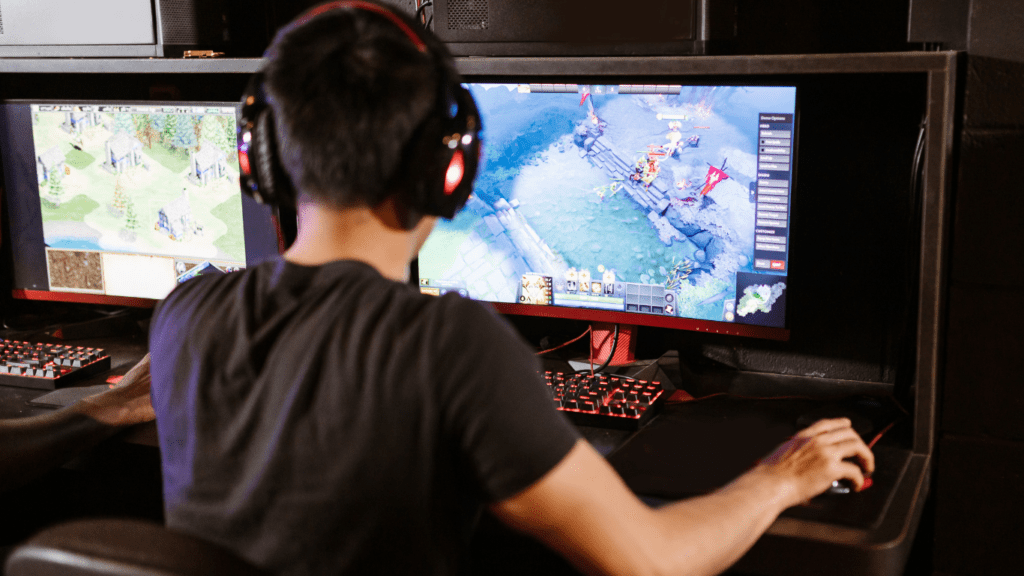Understanding NFTs and Their Role in Gaming
Non-Fungible Tokens (NFTs) are revolutionizing digital ownership in the gaming industry. These unique digital assets enable players to genuinely own, trade, and sell in-game items with real-world value.
What Are NFTs?
NFTs are cryptographic tokens that represent ownership of unique digital items. Unlike cryptocurrencies, which are identical and interchangeable, NFTs have distinct information that makes each one unique.
This uniqueness means NFTs can’t be exchanged on a one-to-one basis with another token. NFTs are usually built on blockchain technology, most commonly Ethereum, which ensures the security and provenance of each asset. Common examples of NFTs include digital art, music, and in-game assets.
How NFTs Are Being Used in Games
Gaming has become a fertile ground for NFTs, allowing players to trade unique items and earn money.
- Digital Collectibles: Games offer unique digital items like skins, weapons, or characters that can be bought and sold. For instance, “CryptoKitties” allows users to trade unique virtual cats.
- Tokenized In-Game Assets: Players can sell game assets on secondary markets, providing potential income. “Axie Infinity” is a game where players earn money by trading characters and items.
- Play-to-Earn Models: Some games incentivize participation by rewarding players with NFTs for achievements. “Gods Unchained” offers cards as rewards, which can be sold or traded.
- Interoperability: NFTs enable items to be used across different games and platforms. “The Sandbox” allows users to create, own, and monetize gaming experiences across multiple platforms.
The use of NFTs in gaming is generating new revenue streams and enhancing the gaming experience by adding real-world value.
Major Players in the NFT Gaming Space
Major players are driving the rapid rise of NFTs in gaming. These innovators are setting industry standards and introducing unique experiences.
Leading NFT Gaming Platforms
Several platforms lead the charge in NFT gaming.
Axie Infinity offers a play-to-earn model where players can collect, breed, and battle with digital pets called Axies. It runs on the Ethereum blockchain. Decentraland provides a virtual world where users buy, sell, and build on parcels of virtual land, integrating NFTs into real estate.
Enjin supplies a blockchain ecosystem that enables game developers to create and manage in-game items as NFTs, ensuring actual ownership and interoperability across different games.
The Sandbox empowers players to build, own, and monetize their gaming experiences using NFTs, emphasizing user-generated content.
Popular NFT-Based Games
Certain games have become synonymous with NFT integration.
CryptoKitties lets users collect, breed, and trade virtual cats with unique attributes and DNA, pioneering blockchain-based games.
Gods Unchained is a digital card game where players own their cards as NFTs, ensuring actual ownership and tradability.
Sorare combines fantasy soccer with digital cards, allowing players to trade and play using officially licensed soccer player cards as NFTs.
Illuvium offers an open-world RPG that incorporates NFTs for in-game assets, blending traditional gaming experiences with true digital ownership.
Benefits of NFTs in Gaming

Leveraging NFTs in gaming brings substantial advantages to players and developers, reshaping digital engagement and economic models.
Ownership and Asset Control
NFTs empower players with actual ownership and complete control over their in-game assets. Unlike traditional games where items reside on developer-controlled servers, NFTs exist on decentralized blockchain networks.
This decentralization ensures players can trade, sell, or transfer their assets without restrictions. For example, gamers owning NFT-based items in Axie Infinity or Decentraland can freely trade on various marketplaces, retaining value beyond the game’s ecosystem.
New Revenue Streams for Developers
Integrating NFTs introduces new monetization avenues for developers. By creating limited-edition assets, developers can generate revenue through initial sales and secondary market transactions.
Each transaction on the secondary market often includes a royalty fee for the original creator, ensuring a continuous revenue stream. Games like The Sandbox and Enjin have successfully employed this model, attracting both players and investors, and contributing to the ecosystem’s financial health.
Incorporating NFTs in gaming not only enhances player experience but also fosters economic growth within the industry.
Challenges and Criticisms
Despite the positive impact of NFTs on the gaming industry, they face several challenges and criticisms.
Environmental Concerns
NFT transactions generate significant energy consumption, leading to environmental concerns. Most NFTs use blockchain networks like Ethereum, which employs the Proof of Work (PoW) consensus mechanism.
This process involves intensive computational tasks that consume large amounts of electricity. For instance, Digiconomist estimates that a single Ethereum transaction can consume as much energy as an average U.S. household’s weekly electricity use. Though some blockchains are shifting to more eco-friendly methods like Proof of Stake (PoS), the environmental impact remains a point of contention.
Market Volatility
The value of NFTs in gaming is highly volatile, raising economic concerns. Prices of NFTs can skyrocket or plummet within short periods, making it a speculative market. For example, some in-game items may see their values multiply within days, only to lose the same value just as quickly.
This volatility can deter players and investors concerned about financial stability. Fluctuations can affect gamers who invest real money into NFT assets, potentially leading to significant financial losses.
Legal and Ethical Issues
The legal landscape around NFTs is still evolving, presenting potential risks. Regulations on digital ownership and intellectual property are not uniformly defined across regions. This inconsistency can lead to legal disputes over asset ownership, copyright, and fraud. Additionally, ethical issues arise regarding fair practices and the potential for exploitation.
For instance, younger gamers who spend large sums on NFTs may lack the financial awareness to understand the risks involved. Moreover, concerns about money laundering through NFTs are escalating, drawing criticism from regulatory bodies. These issues highlight the need for clearer regulations and ethical guidelines in the NFT gaming space.
Future of NFTs in the Gaming Industry
The future of NFTs in the gaming industry promises advancements and innovations. Trends indicate growing adoption of blockchain technology and evolving user experiences.
Upcoming Trends
Various trends are shaping the future of NFTs in gaming:
- Interoperability: Developers aim to create assets usable across multiple games. For instance, a sword earned in one game could be wielded in another, boosting cross-platform value.
- Play-to-Earn: This model rewards gamers with crypto or NFTs for in-game achievements. Popular examples include Axie Infinity, where players earn tokens.
- Virtual Real Estate: Digital lands in games like Decentraland and The Sandbox are on the rise. Players buy, sell, or develop these properties, merging gaming with real estate concepts.
- Enhanced Gamer Control: Developers create systems allowing gamers to influence game development decisions through NFT ownership or token-based voting mechanisms.
Expert Predictions
Industry experts foresee significant changes driven by NFTs:
- Mainstream Adoption: Analysts anticipate major gaming studios incorporating NFTs in their titles, making NFT integration standard.
- Economic Ecosystems: Experts predict robust in-game economies, where players fully monetize their efforts. Virtual item markets might rival real-world markets in complexity and value.
- Legal Frameworks: Legal professionals expect clearer regulations, ensuring secure and fair NFT transactions.
- Technological Advancements: Researchers focus on eco-friendly blockchain solutions, countering critique related to energy consumption.
The gaming industry’s future with NFTs looks transformative and dynamic.



 Chief Content Strategist & Unique Author
Paulo Okellyansy is the Chief Content Strategist responsible for curating and managing the platform’s editorial direction. With an in-depth knowledge of cryptocurrency markets and digital finance, Paulo crafts engaging, informative content that resonates with both newcomers and seasoned crypto enthusiasts. His ability to simplify complex topics and identify emerging trends has helped position the website as a go-to resource for cryptocurrency insights.
Chief Content Strategist & Unique Author
Paulo Okellyansy is the Chief Content Strategist responsible for curating and managing the platform’s editorial direction. With an in-depth knowledge of cryptocurrency markets and digital finance, Paulo crafts engaging, informative content that resonates with both newcomers and seasoned crypto enthusiasts. His ability to simplify complex topics and identify emerging trends has helped position the website as a go-to resource for cryptocurrency insights.
